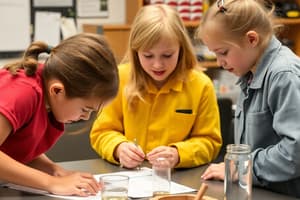Podcast
Questions and Answers
Which type of data is considered qualitative?
Which type of data is considered qualitative?
- Temperature in degrees Celsius
- Color of a flower (correct)
- Length measured in centimeters
- Mass measured in kilograms
What is the importance of communicating scientific findings?
What is the importance of communicating scientific findings?
- It facilitates collaboration and dissemination of knowledge. (correct)
- It prioritizes individual contributions over team efforts.
- It reduces the need for collaboration.
- It limits the peer review process.
Which tool would you use to measure volume?
Which tool would you use to measure volume?
- Ruler
- Scale
- Graduated cylinder (correct)
- Thermometer
What process involves drawing conclusions based on observations?
What process involves drawing conclusions based on observations?
What is the purpose of predicting in a scientific context?
What is the purpose of predicting in a scientific context?
Which of the following best describes the process of classifying?
Which of the following best describes the process of classifying?
What type of data would a scale provide?
What type of data would a scale provide?
What is the first step in the process of inferring?
What is the first step in the process of inferring?
Flashcards
Observation
Observation
Noticing and describing events carefully and systematically.
Qualitative Observation
Qualitative Observation
Descriptive observations, no numbers.
Quantitative Observation
Quantitative Observation
Observations with numbers; measurements.
Communicating
Communicating
Signup and view all the flashcards
Measuring
Measuring
Signup and view all the flashcards
Inferring
Inferring
Signup and view all the flashcards
Predicting
Predicting
Signup and view all the flashcards
Classifying
Classifying
Signup and view all the flashcards
Study Notes
Science Process Skills
-
Observation
- Definition: The act of noticing and describing events or processes in a careful and orderly way.
- Types:
- Qualitative: Descriptive, non-numerical data (e.g., color, texture).
- Quantitative: Numerical data (e.g., length, mass).
- Importance: Forms the basis for scientific inquiry and data collection.
-
Communicating
- Definition: Sharing observations, findings, and ideas with others through various formats.
- Methods:
- Verbal communication (discussions, presentations).
- Written communication (reports, articles).
- Visual communication (graphs, charts).
- Importance: Essential for collaboration, peer review, and dissemination of knowledge.
-
Measuring
- Definition: The process of obtaining quantitative data using appropriate tools.
- Common Tools: Rulers (length), scales (mass), thermometers (temperature), graduated cylinders (volume).
- Importance: Allows for accurate and repeatable data collection, facilitating comparisons and analysis.
-
Inferring
- Definition: Drawing conclusions or making interpretations based on observations and prior knowledge.
- Process:
- Analyze observations.
- Consider context and background information.
- Formulate logical conclusions.
- Importance: Helps to develop hypotheses and understand underlying causes of phenomena.
-
Predicting
- Definition: Making forecasts about future events based on current evidence and past experiences.
- Process:
- Use observations and patterns to anticipate outcomes.
- Develop testable statements that can be investigated.
- Importance: Guides experimental design and exploration of scientific concepts.
-
Classifying
- Definition: Organizing objects or information into categories based on shared characteristics.
- Criteria: Can include physical attributes, behaviors, or functions.
- Importance: Helps to simplify data management and enhances understanding of relationships within groups.
Observation
- Involves careful and systematic noticing and describing of events or processes.
- Two types:
- Qualitative observations provide descriptive, non-numerical data (e.g., colors, textures).
- Quantitative observations yield numerical data (e.g., measurements of length, mass).
- Fundamental to scientific inquiry and data collection, forming the foundation for further investigation.
Communicating
- Refers to sharing scientific findings, observations, and ideas with others.
- Methods include:
- Verbal communication through discussions and presentations.
- Written communication in formats such as reports and articles.
- Visual communication utilizing graphs and charts.
- Critical for collaboration, peer review, and spreading knowledge across scientific communities.
Measuring
- Involves obtaining quantitative data with precision using specific tools.
- Common tools encompass:
- Rulers for measuring length.
- Scales for measuring mass.
- Thermometers for measuring temperature.
- Graduated cylinders for measuring volume.
- Accurate measurement is vital for repeatable data collection, allowing for effective comparisons and analyses.
Inferring
- Entails drawing conclusions and formulating interpretations based on observations and existing knowledge.
- Key steps include:
- Analyzing collected observations.
- Considering relevant context and background information.
- Formulating logical, evidence-based conclusions.
- Essential for hypothesis formation and understanding the causes behind observed phenomena.
Predicting
- The act of forecasting future events based on current evidence and historical data.
- Key process involves:
- Utilizing observations and recognized patterns to anticipate outcomes.
- Crafting testable statements to investigate.
- Effective prediction guides experimental design and exploration of scientific concepts.
Classifying
- The practice of organizing objects or information into categories based on shared characteristics.
- Classification criteria may include physical traits, behaviors, or functions.
- Simplifies data management and enhances comprehension of relationships within different groups.
Studying That Suits You
Use AI to generate personalized quizzes and flashcards to suit your learning preferences.




